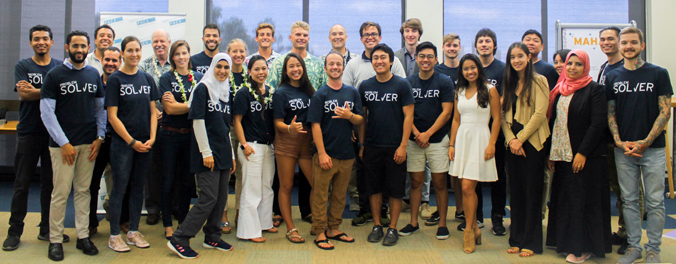A kombucha and kava lounge, a dietary supplement made from banana blossoms and an online education platform for professional tattoo artists are just some of the entrepreneurial possibilities among the teams of founders graduating from the 2019 Summer Startup Launchpad, presented by the Pacific Asian Center for Entrepreneurship (PACE) at the Shidler College of Business.
Each team made a seven-minute presentation to a panel of entrepreneurship and innovation experts and received a certificate for completing the rigorous requirements of the six-week program. Two teams were also voted by their peers as “Most Likely to Orbit,” based on the founders’ progress during the program.
“Summer Startup Launchpad was as challenging as it was rewarding,” said participant and business student Jamison Haussman. “In addition to mentorship from successful entrepreneurs, we’re part of a community of problem-solvers from different industries, all coming under one roof to support each other.”
“Everyone has had an idea for a business at some point in their life. These students decided to take action on their idea to see if there’s something there,” said Peter Rowan, PACE executive director. “We spent the bulk of the six weeks validating the problem. Does their idea solve a significant human problem? If yes, what is a feasible business model? If no, can they pivot their idea to one that will fill a human need?”
Twenty-nine participants comprising 10 teams, representing varying disciplines of study from business to engineering and levels of study from freshmen to doctoral candidates, implemented the lean startup methodology to validate their business ideas. The program forced students to talk to strangers to validate their idea for a product or service and to identify potential customer segments.
Teams were challenged to interview at least 100 customers during the program to gain meaningful insights. Many teams pivoted their ideas and solutions, based on their interview findings. Each team worked with a dedicated business mentor, who advised them during customer validation and business model development. Each team was awarded $4,000 cash to use as seed capital to kick-start their business.
PACE offers this program at no charge to participants through generous donations from the Mamoru and Aiko Takitani Foundation and the University of Hawaiʻi Office of the Vice President for Research and Innovation.
For more information including a list of this year’s projects, go to the PACE website.


